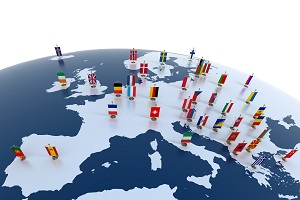
Household demand will continue to support economic activity in the region
An upturn in the global economy—now growing by about 3 per cent— paves the way to reorient policy towards longer-term issues such as addressing climate change, tackling existing inequalities and removing institutional obstacles to development, according to the United Nations World Economic Situation and Prospects (WESP) 2018 Report.
According to the report, in 2017, world economic growth has reached 3 per cent—the highest growth since 2011— as crisis-related fragilities and the adverse effects of other recent shocks subside. The improvement is widespread, with roughly two-thirds of countries worldwide experiencing stronger growth in 2017 than in the previous year. Global growth is expected to remain steady at 3.0 per cent in 2018 and 2019.
Growth prospects in Europe
Against this backdrop, economic activity in the European Union remains robust, with real GDP projected to grow by 2.1 per cent in 2018. Private consumption will remain a major driver of growth, underpinned by rising disposable incomes, falling unemployment, further upward pressure on wages, and low interest rates.
In the United Kingdom, growth will decelerate to 1.4 per cent in both 2018 and 2019, as the economy faces increasing pressure from the effects of “Brexit”—its decision to leave the European Union (EU). However, several economies are expected to see stronger growth. In Spain, GDP is forecast to grow by 2.6 per cent in 2018 and 2.4 per cent in 2019, driven by private consumption, fixed investment—specially in construction and machinery—and solid external demand, including tourism. A similar combination of solid domestic and external demand will drive growth in Ireland, with the economy projected to expand by 2.8 per cent and 3.1 per cent in 2018 and 2019, respectively.
By contrast, Italy will register the lower growth of 1.4 per cent and 1.1 per cent in 2018 and 2019, respectively. Slow employment growth and weak consumer sentiments related to political uncertainty will hinder private consumption growth, while weak public investment and limited access to bank lending will constrain fixed investment.
Risks and policy challenges
Despite the improved short-term outlook, the global economy continues to face risks—including changes in trade policy, a sudden deterioration in global financial conditions and rising geopolitical tensions.
The world economy also faces longer-term challenges. The report highlights four areas where the improved macroeconomic situation opens the way for policy to address these challenges: increasing economic diversification, reducing inequality, supporting long-term investment and tackling institutional deficiencies. The report notes that reorienting policy to address these challenges can generate stronger investment and productivity, higher job creation and more sustainable medium-term economic growth.
For Europe, Brexit negotiations will remain a major source of uncertainty. Any negative surprises or perceived increase in the probability of a negotiation failure would hamper business investment in the United Kingdom. The withdrawal of monetary stimulus by the European Central Bank will also pose challenges in terms of both the timing and design of policy changes and its communication to the public, creating important risks of actual or perceived policy missteps.
While unemployment has been declining across the EU, the solid aggregate figures mask significant dispersion among national labour markets, with unemployment remaining high in Greece, Spain and Italy. Youth unemployment also remains a serious challenge across the region, standing at 16.6 per cent EU-wide.
About the report: The World Economic Situation and Prospects report is the UN’s flagship publication on expected trends in the global economy. WESP is produced annually by the UN Department of Economic and Social Affairs (DESA), the UN Conference on Trade and Development (UNCTAD), the five UN regional commissions and the World Tourism Organization (UNWTO).
For more information, please visit: http://www.un.org/en/development/desa/policy/wesp/